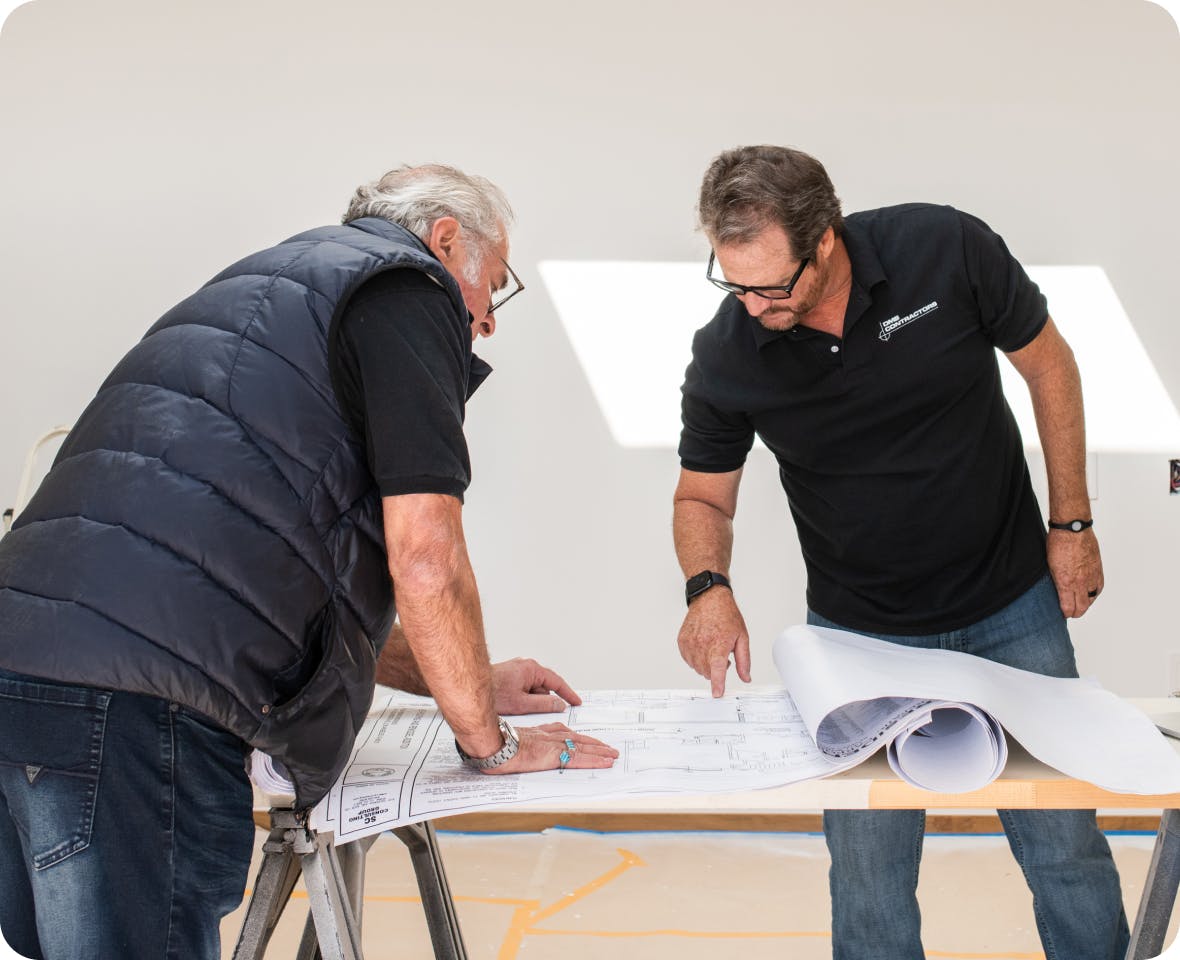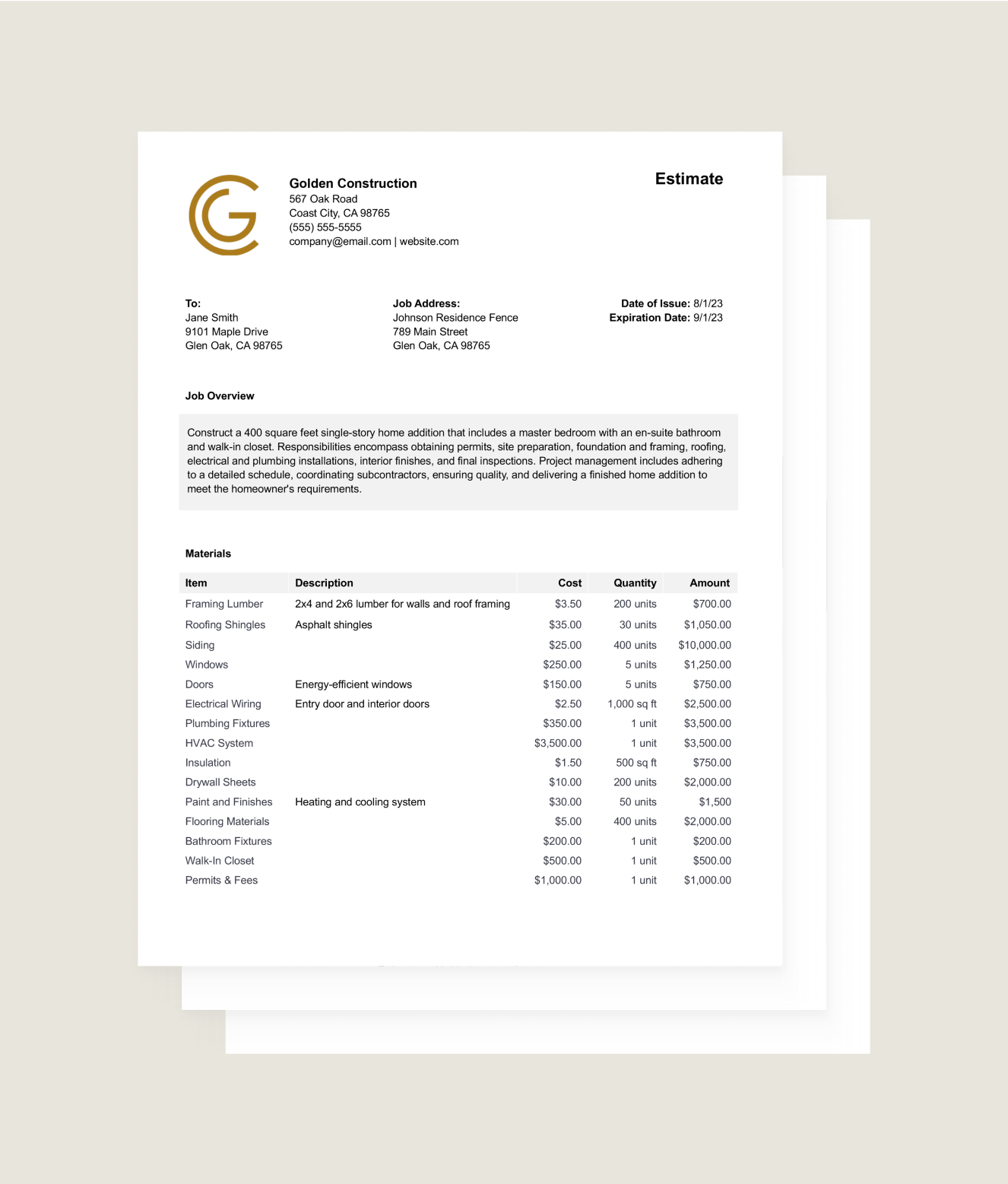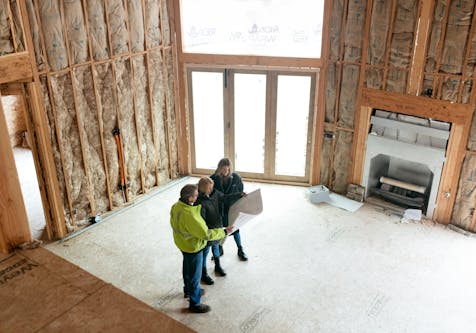Free Template: How to Estimate Construction Projects as a General Contractor
Nail your estimates with our general contractor estimate template & guide to estimating construction projects.

Providing a strong initial estimate for a construction project helps general contractors start off on the right foot with potential clients. In this guide, we show you how to estimate construction projects as a general contractor, and help you hone your estimating skills.
We also provide a free, downloadable, editable general contractor estimate template to help you get started. The customizable general contractor estimate template lets you easily tailor it to fit your business and needs. It also includes a general contractor estimate example so you can see how other construction pros do it.
Click on a link below to jump to the section you’re most interested in:
- Free general contractor estimate template
- What is a general contractor estimate?
- Why are estimates important?
- When do you send a general contractor estimate?
- What should be included in an estimate?
- Optional sections to include in a contractor estimate template
- How to create a general contractor estimate step-by-step
- Alternatives to estimate templates
- Final estimating tips
Download our Free General Contractor Estimate Template

Here's a General Contractor Estimate Template on Us!
Customize this General Contractor Estimate Template to secure your next job.
If perfecting the estimating process seems daunting as you kick off your contractor business, consider using a general contractor estimate template PDF, Word or Excel document. Download our fully customizable contractor estimate template for free.
While a free contractor estimate template is a great way to start, many general contractors soon turn to general contractor estimating software. The software helps them run their businesses more efficiently and create accurate, professional estimates more quickly.

Using estimation software as part of an all-in-one management software like Houzz Pro provides the tools you need to navigate your business, and manage projects from start to finish. The software is specifically designed for general contractors and makes it easy to work from anywhere on any device. Explore our other templates for free and try a free trial of Houzz Pro.

What is a General Contractor Estimate?
Knowing how much a project will cost you as a general contractor is at the heart of running a construction business. A general contractor estimate includes the costs for the labor and materials required, other fixed expenses, and includes the profit margin you will incorporate to insure you are earning money and growing your enterprise. A general contractor construction estimate template also sets expectations for homeowners to help them understand how their construction plans match up with their budget.
An estimate often serves as the basis for making a final quote to a client of exactly what the project will cost them, or for submitting a formal bid on a project. In some cases, contractors are also requested to submit a proposal. This folds in the information included in an estimate, quote and bid, but also includes more specific details about your general contractor business and examples of past projects.

Why are General Contractor Estimates Important?
Clients want to know how much their construction project is going to cost them, and you need to know how much it is going to cost you. Having an accurate estimate helps you know how much you need to charge for the job to cover the project costs, and your fixed expenses while earning a healthy profit margin to assure your business will continue to grow.
Here are some of the factors that can influence a general contractor estimate:
- Job Size Both the magnitude and complexity of a construction job impacts the costs of the project. Understand the scope of the work being requested.
- Condition of Site The topography of a site and condition of the current structures can add to the costs of the work at hand.
- Location of Job Travel time to more remote jobs can add to the expenses, as well as how easily it is to access the site once you get there. Be sure to figure in these extra costs.
- Quality High end materials for a luxury home will produce a higher estimate than more mid range or standard materials. The same is true for the number of architectural features and diversity of materials being sought.
- Subs Needed Consider what type of trades people and subcontractors are required and their skill level. The variety of skills needed will depend on how extensive the project is and what type of rooms are being constructed or remodeled. Higher skilled labor will cost more, and their hourly rate will also depend on the availability of labor and demand in your region.

When Do You Send a General Contractor Estimate Form?
A general contractor estimate form is often the first document a construction pro presents to a client to provide them with information on the price of a construction project. It is typically not the final document nor final price. It is usually followed up with a formal quote that is more specific and final. Once all parties sign off on a quote, it becomes the basis for what you will charge the client for a job.

What Should be Included in a General Contractor Estimate?
The details included in a general contractor estimate template may vary depending on the type of job and requests from the clients, but this is the basic information typically covered in every estimate:
- Company Name, Logo Brand your general contractor estimate form with your company information and logo to make it uniquely yours. Also include any contact information and who will be the point person for the project.
- Client Information List the pertinent client details including name, address and how to reach the best contact person for the job.
- Estimate Number & Date Every construction estimate template should include an estimate number and the date of the estimate. Having an intuitive numbering system makes it easier to locate the document. Adding a date is especially helpful if you set a time-limit, such as 30 days for when the prices quoted are effective.
- Table of Labor & Materials This breakdown of the materials and labor required to complete the job shows clients the costs behind their project.
- Summary of Costs The cost summary folds in other expenses associated with the project as well as the labor and materials. Present this in a way that makes it easy for clients to understand where their budget will be going.
- Acceptance & Signature Leave space for all parties to sign and date upon acceptance of the general contractor cost estimate.

Optional Sections to Include in a Contractor Estimate Template
The extent of detail you decide to provide in a contractor estimate template will vary, depending on the circumstances. Decide if there is other information appropriate to include, especially if you think the additions will increase your chances of winning the job. Here are some examples:
- Scope of Work Including a short summary of exactly what the job will entail can help assure the client that you understand the vision they have for their home project. It also can be helpful in larger or more complex jobs to spell out these details so that everyone is on the same page of what is included and what is not.
- Discounts If you offer lower prices under certain circumstances, you may want to list your discounts. For example, do you take off a percentage for new clients, or those who pay for the project up front?
- Terms & Conditions This is a good place to note when the estimated prices expire, payment schedules, change order policies and deadlines for clients to inspect the work once completed.
- Additional Notes What have you forgotten? Note here any items that are important, but don’t fit a specific category.

How to Create a General Contractor Estimate Step-by-Step
Drawing up a strong general contractor estimate means striking a balance in the amount of information you include. You want to provide enough detail so that your potential customer understands the services you are providing, but you do not want to get so deep in the weeds that the estimate is difficult to decipher.
Here’s a step by step guide toward reaching that goal:
- Choose an Estimate Template or Tool Luckily, technology has greatly improved the process of making a general contractor estimate. Gone are the days of staring at a blank piece of paper or an empty screen. A general contractor estimate template that is downloadable and editable simplifies making an estimate and delivering it to a client. Estimating software makes the task even easier and quicker. Choose the tool that is right for you.
- Review Project Plans Do you know the full scope of the work being sought? Review the plans, circle back with the homeowners and visit the site if needed to make sure you understand the extent of the project and time it will take to complete.
- Evaluate Structural Requirements Is the project one-story wood construction, or does it involve multiple floors and other types of material such as steel beams, brick, stone, and concrete? These considerations will impact the price.
- Determine Mechanical, Electrical and Plumbing Needs Consider complexities and extent of the electrical wiring and plumbing infrastructure required, as well as other aspects such HVAC needs.
- Consider Non-Standard Project Requirements Are there elements of the project that make it beyond your typical job? Be sure to evaluate the special circumstances that can add to the costs and risks of completing the project.
- Estimate Material & Labor Costs The core of every general contractor estimate is the cost of the materials and labor it will take to do the construction project . Here is some guidance for accurately estimating costs:
Divide materials and labor into work packages One approach is to list every specialty subcontractor you will need to hire and create a price package for each which spells out both the labor and material costs.
Review Needs Ensure that no tasks are duplicated, missing or unclear.
Materials: Here are some steps to take to accurately calculate material costs:
- Conduct takeoffs to determine the quantity materials you will need for each part of the project
- Solicit pricing from suppliers/vendors and keep on top of pricing trends
- Factor in the quality of materials needed
- Understand how supply and demand are impacting prices in your region
Labor Costs Here are factors to take into account when calculating your labor expenses:
- Roles Needed Consider all the types of labor and skilled tradespeople you will need to complete the project.
- Hours Estimate how long it will take to complete each job and add them up to reach your time total. Consider the complexity of the tasks and magnitude of the project.
- Determine the Hourly Rate Once you know the types of labor you need, research the rates paid for the various tradespeople and come up with your average.
- Determine Markup Add the markup you will need to cover your fixed costs and your profit margin. Your margin is your net sales revenues minus your labor, materials and overhead costs.
- Calculate Total Costs Once you have estimated the cost in every category add them up to get the total costs.
- Get a Second Pair of Eyes Ask someone knowledgeable and trustworthy to review your general contractor estimate to assure you have not missed something.
- Preview and Send Take one last look, and hit send. Your estimate is on its way to your future customer.
- Track Feedback Establish a system to easily track any questions or comments from homeowners, and to record ultimate approval of your estimate.

Alternatives to General Contractor Estimate Templates
Software specifically tailored to general contractors makes creating general contractor estimates easier and helps professionals run their business more efficiently. General contractor estimating software like Houzz Pro lets you upload your own list of prices, or you can use the one provided for your region.
Construction professionals who use the software, which has a built-in takeoff tool, create general contractor estimates 10 times faster than their competitor so they can deliver estimates to homeowners as quickly as they expect them, increasing their chances of winning the job.

Final General Contractor Estimating Tips
- Understand the Scope Knowing the full extent of the project a homeowner is seeking avoids the costly mistakes that come with overlooking a key aspect of the job. Visit the site as needed, ask clients clarifying questions, and check and double check.
- Consider the Skills Required No two jobs are created equal. Figure in the level of skill and experience required to complete a project so you accurately estimate the cost of hiring the right people to do the job.
- Factor in Risks Take into account any risks of a job, including the chances you may discover unexpected surprises during demolition or that inclement weather will continually delay or stop work.
- Value Overhead Including the costs of running your business, and accounting for a profit margin, helps assure your enterprise will be sustainable in the long run.
- Include Related Service Consider what essential services not directly related to construction need to be accounted for such as site prep and disposal of construction waste.
- Check out the Competition Knowing how your job prices measure up with your competitors can help you gauge where you fit in the marketplace and whether adjustments are needed to stay competitive.

Conclusion
Delivering professional, accurate general contractor estimates quickly helps win jobs, and learning how to do it well takes practice. The task is easier once you know the right information to include and how to find it.
Using the right estimation tools cuts the learning time, and helps you run your business more efficiently. Explore the takeoff and estimating features in our general contractor software. Try a free trial of Houzz Pro all-in-one management software.

Want advice delivered to your inbox?
Unlock industry insights and updates for contractors and design pros
By signing up, I agree to the Houzz Terms of Use and Privacy Policy and that Houzz may use my information to contact me about relevant content, products, and services.









Join the conversation by commenting or asking a question below. The Houzz team reads every single comment, and we’ll get back to you by email if you need us!